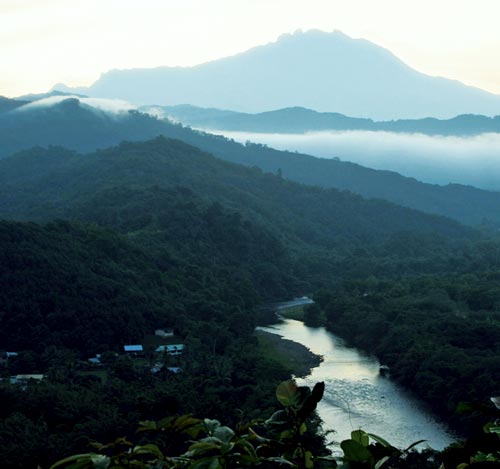Stern resolve
It was quite late when we reached the tarred road. There was no traffic. We approached an isolated Chinese shophouse on the roadside, and banged on the door. At the best of times the rural Chinese are not always noted for their charity to travellers in distress. Recently however there had been a few pirate attacks in the coastal areas. There was no way a Chinese shopkeeper was going to open his door to a bunch of suspicious characters appearing out of the night. The doors and windows remained firmly locked and shuttered.
We plodded on miserably for a mile or so further down the road until we came to another wooden Chinese house built on stilts. We had the same reception. It began to look as though we might have to walk all the way back to Sandakan town.
The prospect did not appeal to any of us, but it was apparently especially repugnant to Ah Chang. He sprang into action. He suddenly changed from an inscrutable Oriental Buddha into a very scrutable Chinese devil. He leapt at the door, banged on it with his fist. He directed a violent stream of Hainanese invective at it. Fortunately perhaps, I could not understand a word.
It had no effect. The door remained firmly closed. A battered pick-up truck stood in the drive. I tried its doors. It was locked. Tundah and I turned to leave, but Ah Chang was made of sterner stuff. He returned to the house, banged on the door again until it rattled, and once again unleashed a furious tirade.
Silence descended. The door remained firmly closed, but a car-key slowly inched its way out from underneath. We opened the old banger, and climbed in. After one or two attempts I got it started and we were on our way to Sandakan.
“Very nice people to lend us their car,” I said.
“Not nice people, Master,” said Ah Chang in what was the longest speech he ever made to me. “I tell them – I no get car key, I take petrol from car and burn house down.” Obviously, I thought, he was a more redoubtable operator on terra firma than on the water.
Ah Chang continued to prove himself a man of stern resolve and firm decision. When we reached the town, he disappeared swiftly, and we never set eyes on him again. He did not even attempt to collect his one day’s pay. Perhaps he thought we might charge him for the boat-trip.
Tundah and I returned to the estate early the following morning, delivering back the Chinese shopkeeper’s car enroute, along with an envelope containing a suitably handsome hire-fee. We travelled from the Gum Gum jetty to the estate in a hired canoe. When we came into the bay, the sea was glassy-calm.
“You would not believe it, but it can get very rough sometimes at this season,” said the canoe owner, “especially in the late afternoon.” Tundah and I said nothing.
The Pekaka was, alas, a write-off, except for its outboard engines. I placed an order with Kwong Borneo for a much larger and more stable fibre-glass catamaran. By the time Pekaka II arrived, Tundah had been promoted to be the captain of one of our large cargo kumpits.
To replace him as our outboard driver, we selected his friend Jalil Baguing. Jalil was an intelligent worker, and one of my favourite characters among the original pioneers whom we recruited from Tawau on my very first visit. Needless to say, Jalil was more adept with machinery than Tundah had been.
When I returned to the Labuk on a personal visit 30 years later, after I had retired from Unilever, I was reunited with both of them. It might be worthwhile having a flash-forward to recount something of their successful further careers, since they illustrate very well both the calibre of some of our pioneer workers, and the benefits the oil palm has brought to the people of Borneo.
Tundah married a Kadazan girl, and he eventually became a Land Rover driver with the Sabah Land Development Board (SLDB). When he retired, he opened a shop on the Labuk, well situated between the SLDB estates and Tungud estate. I visited them and had tea with them in the shop which was obviously doing very good business.
Their half a dozen children and grandchildren crowded around while Tundah recounted the tale of the big storm. Their oldest son had become the headman of the district, and Tundah himself was a leading patriarch in the Labuk Kadazan community.
Jalil also had a very successful career. He graduated from driving our outboard craft to driving one of our tractors. From there he bought a tractor of his own, and became a very successful transport contractor for SLDB. I visited him in his home on the outskirts of Sandakan. He was now Haji Jalil since he had been on the haj several times.
He had married a Sino-Kadazan nurse. They had four daughters, all of whom had been sent to the University of Strathclyde to complete their education. Haji Jalil told me with great pride that one of them was a doctor, one a dentist, one an accountant, and the youngest was a personnel manager in a large company.
Datuk Leslie Davidson
Author, East of Kinabalu
Former Chairman, Unilever Plantations International
The second part will be published in the next issue. This is an edited chapter from the book published in 2007. It can be purchased from the Incorporated Society of Planters; email: isphq@tm.net.my



